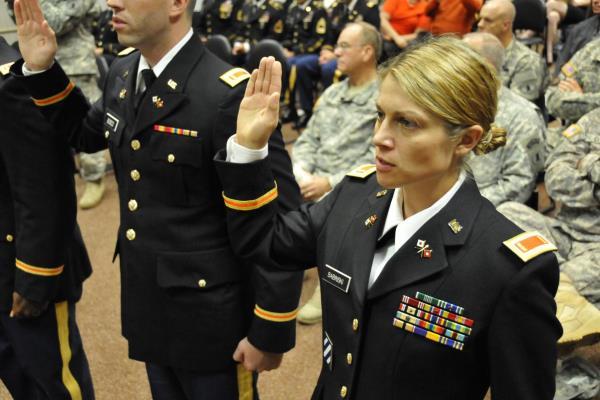The wives of two Army soldiers, who are naturalized U.S. citizens, will not be forced to leave the country after U.S. Citizenship and Immigration Services officers in Atlanta and Philadelphia – in separate decisions – exempted them from an agency policy that threatens to split up some military families.
The policy, only recently established, states that once foreign-born U.S. military enlistees become citizens their dependents may not legally stay in the country. Margaret Stock, an immigration lawyer who challenged the policy in Atlanta on behalf of an Army couple, said the move reversed previous practice.
“The immigration system can be so random and arbitrary,” she said. “It doesn’t make any sense [to split up these families] ... The examiner said it was crazy. He said, ‘I agree with you, she should not have to go home.’”
She said her clients, the soldier and his wife, were especially worried because they had no idea where the U.S. would send her if she had to leave. In many cases when the service member is from one country and the spouse is from another “it’s not always clear what country spouse will go back to.”
At the same time, Stock was arguing for her couple, a Philadelphia attorney, William Stock, was making the same argument for another Army husband and wife, both from Guyana.
Margaret Stock said she does not know where her client will be assigned yet. William Stock expects his client “will be assigned to one of the units in the 439th Medical Battalion out of [Joint Base] McGuire-Dix” in New Jersey.
The service members in both cases entered the Army under the Military Accessions Vital to the National Interest program, or MAVNI. While some foreign nationals have joined the Air Force under the program, most are doctors who will be commissioned in the Army Reserve. They fulfill active-duty service commitments and, in many cases, hold full time jobs with the Department of Veterans Affairs.
The MAVNI program was opened up to about 1,000 individuals.
Those who qualify enter the military with the enlisted grade of E-4 and are fast-tracked for citizenship. Once that is accomplished, they are given a commission, complete the basic officer leadership course and assigned to a duty station.
Previously, the dependents of foreign nationals who enlisted under MAVNI had no problem getting legal residence – a green card – once their service member became a citizen.
A few months ago, however, USCIS stated that there would be no automatic granting of legal residency to dependence once the soldier became a citizen and the visa under which the soldier entered the country was no longer valid. Instead, dependents would have to return to their country of origin and wait two years before applying to enter the U.S.
Margaret Stock said the wait-time for the application process is about 18 months, meaning a family would be separated for more than three years.
A spokesman for USCIS told Military.com earlier this month that the policy is under review and may be changed to accommodate these military families. He said it still must be determined if USCIS can effect a modification by a regulatory change or if it will require congressional action.
-- Bryant Jordan can be reached at bryant.jordan@military.com.



























